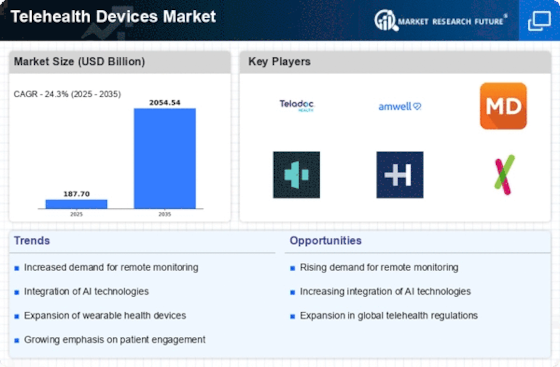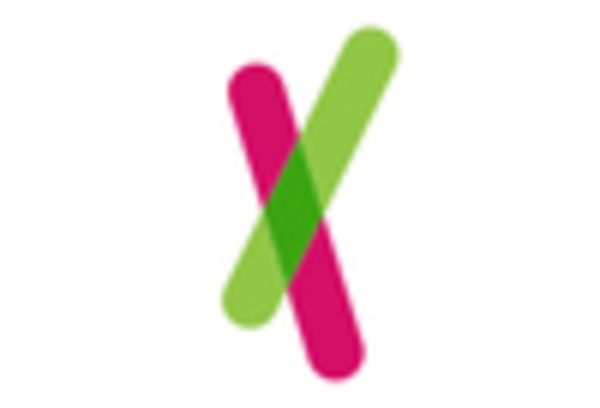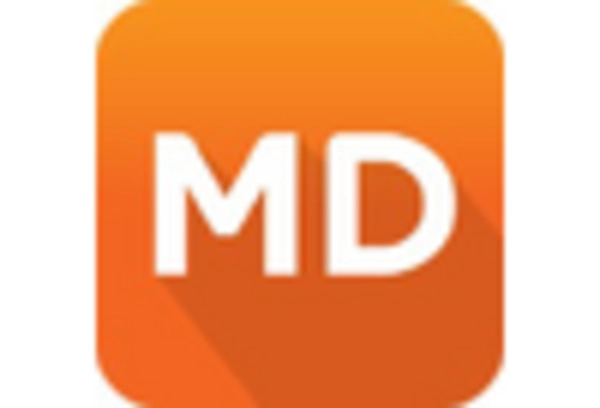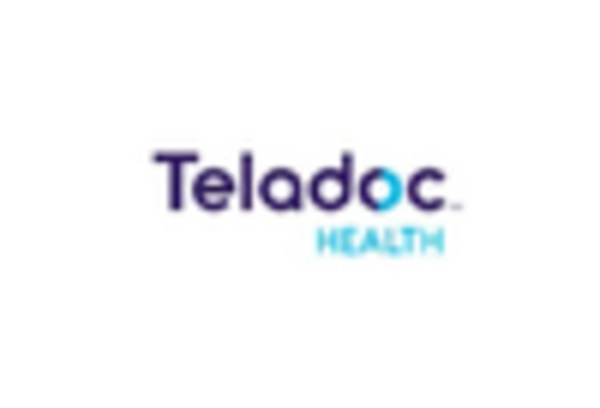Regulatory Support for Telehealth
Regulatory support is a crucial driver for the Telehealth Devices Market, as governments and health organizations increasingly recognize the importance of telehealth solutions. Policies that promote telehealth adoption, such as reimbursement for virtual visits and streamlined licensing processes, are being implemented to encourage healthcare providers to adopt telehealth technologies. For example, recent legislative changes have expanded reimbursement for telehealth services, which has led to a significant increase in telehealth utilization. This supportive regulatory environment fosters innovation and investment in telehealth devices, ultimately contributing to the growth of the Telehealth Devices Market. As regulations continue to evolve, they are likely to create a more favorable landscape for telehealth solutions, further driving market expansion.
Rising Demand for Remote Monitoring
The Telehealth Devices Market experiences a notable surge in demand for remote monitoring solutions. This trend is largely driven by the increasing prevalence of chronic diseases, which necessitate continuous health tracking. According to recent data, approximately 60 percent of adults have at least one chronic condition, leading to a heightened need for devices that facilitate remote patient monitoring. These devices enable healthcare providers to collect real-time data, enhancing patient engagement and adherence to treatment plans. Furthermore, the convenience of remote monitoring reduces the need for frequent in-person visits, thereby alleviating the burden on healthcare facilities. As a result, the Telehealth Devices Market is likely to witness substantial growth as more patients and providers recognize the benefits of remote health management.
Growing Focus on Mental Health Services
The Telehealth Devices Market is witnessing a growing focus on mental health services, which has become increasingly recognized as a critical component of overall health. The demand for mental health support has surged, prompting healthcare providers to explore telehealth solutions as a means to deliver care. Data indicates that nearly 20 percent of adults experience mental illness, and telehealth offers a convenient and accessible way for individuals to seek help. Telehealth devices designed for mental health services, such as virtual therapy platforms and mental health monitoring tools, are gaining traction. This trend not only addresses the rising need for mental health support but also positions the Telehealth Devices Market for growth as more individuals seek remote access to mental health resources.
Technological Advancements in Telehealth
Technological advancements play a pivotal role in shaping the Telehealth Devices Market. Innovations such as high-definition video conferencing, mobile health applications, and advanced diagnostic tools are transforming the way healthcare is delivered. The integration of these technologies enhances the quality of care, making it more accessible and efficient. For instance, the use of mobile health applications has increased by over 30 percent in recent years, allowing patients to manage their health from the comfort of their homes. Additionally, the development of sophisticated telehealth platforms facilitates seamless communication between patients and healthcare providers. This evolution in technology not only improves patient outcomes but also drives the expansion of the Telehealth Devices Market as stakeholders seek to leverage these advancements for better healthcare delivery.
Increased Investment in Telehealth Startups
Investment in telehealth startups is a significant driver of the Telehealth Devices Market, as venture capital and private equity firms increasingly recognize the potential of telehealth solutions. In recent years, funding for telehealth startups has surged, with investments reaching billions of dollars. This influx of capital enables startups to innovate and develop cutting-edge telehealth devices that cater to diverse healthcare needs. The competitive landscape is evolving, with new entrants bringing fresh ideas and technologies to the market. As these startups continue to emerge, they are likely to contribute to the overall growth of the Telehealth Devices Market by introducing novel solutions that enhance patient care and streamline healthcare delivery.

















Leave a Comment